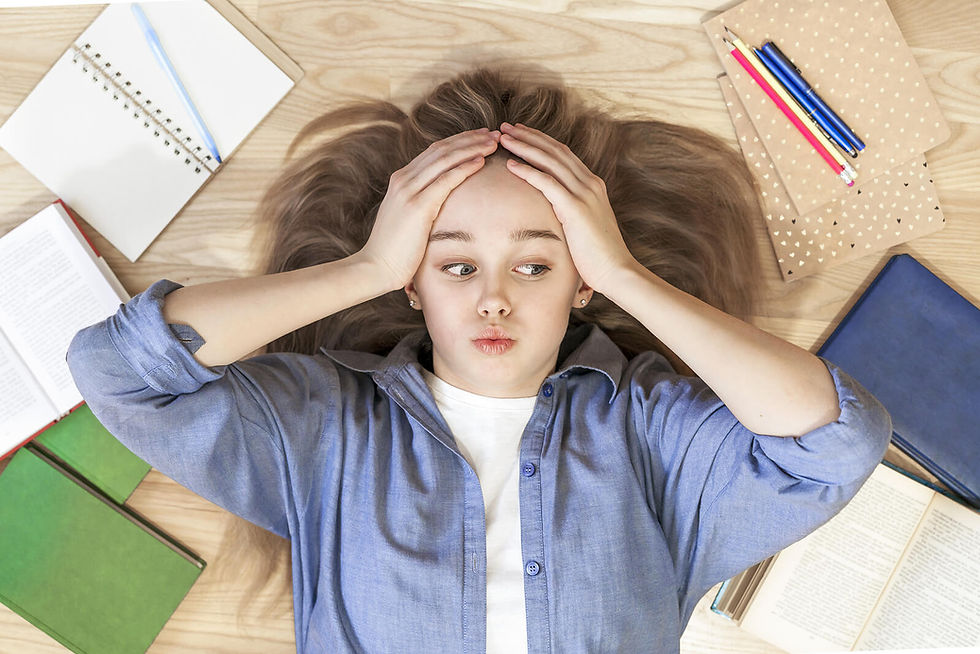Understanding & Navigating Teenage Anxiety: A Guide for Parents From Teen Therapists
- Liz Morrison, LCSW
- Feb 5, 2024
- 5 min read
Updated: Mar 21, 2024
As teens grow and develop, it’s normal for them to experience life stressors and worries. After all, adolescence is a period of intense change for teenagers. Physical changes in the body, hormonal fluctuations, social changes, and increases in pressures at school and at home can all impact a teen’s mental and physical health. Some amount of anxiety is normal during adolescence.
However, excessive anxiety can be indicative of an anxiety disorder. Teens who struggle with anxiety disorders often do not get better on their own. If left untreated, anxiety can cause teens to engage in unhealthy coping mechanisms such as substance use or an eating disorder. As a parent, understanding anxiety red flags to watch for, as well as common causes of anxiety in teenagers, can help you decide whether to seek extra support for your teen with Therapy for Teens.
Signs and Symptoms of Anxiety in Teens
Navigating the highs and lows of adolescence is no easy feat. As a parent, how can you tell whether your child’s behavior is normal and age-appropriate, or a red flag for underlying mental health issues? Unfortunately, there’s no guaranteed way to know. Observing your teen’s behaviors and having conversations with them about their internal experiences can help you better understand what their mental health is like.
Signs of Anxiety in Teens
Signs of anxiety are behaviors that someone can observe in someone else. You as a parent can watch for behavioral changes in your child that might indicate anxiety. The following observable behaviors can be signs of anxiety in teens:
Excessive irritability or other mood changes
A “buzzing” energy
Quicker or louder speech patterns
Distractibility or jumpiness
Difficulty sleeping or sleeping too much
Avoiding activities, situations, or people that make them anxious
Reduced time spent socializing with friends
Notable loss of interest in activities they used to enjoy
Performance change in academics, athletic activities, or extracurriculars
Negative self-talk
Change in appetite, including eating less or more
Risky behaviors such as substance use
Symptoms of Anxiety in Teens
Symptoms of anxiety, on the other hand, are internal experiences that only the individual with anxiety can feel. These are not outwardly observable. Talking to your kid about their feelings, emotions, and experiences can help give you a sense of whether they might be struggling with anxiety. Symptoms of anxiety in teens include the following:
Persistent worry and stress
Fear that something bad is going to happen
Focusing on worst-case scenarios
Difficulty concentrating
Difficulty relaxing
Feeling on edge or restless
Physiological symptoms like fast heart rate, sweating, shaking, and nausea
Physical symptoms like headaches, stomachaches, muscle aches, or other unexplained pains
Common Causes of Anxiety in Teenagers
Teen mental health is becoming worse across the US. One study showed the prevalence of anxiety in teens increased from 34% in 2012 to 44% in 2018. For girls and members of the LGBTQ+ community, these numbers are even higher.
So what’s causing so much anxiety among teens? There are a number of factors at play, including genetics, pressure to succeed, social media usage, and societal issues.
Genetics can cause up to 40% of anxious characteristics in children. In other words, anxiety and anxiety disorders are highly inherited and are frequently passed from generation to generation.
Pressure to succeed in academics, sports, and extracurriculars is intense among teens. Colleges and even high schools have extremely high standards for admission, and teens face pressure to go to the best schools, get the best grades, and be the best at everything they do.
Social media usage can heavily impact a teen’s anxiety levels. Spending too much time on social media can impact executive functioning, make teens compare themselves harshly to others, assume everyone’s lives are better than theirs, and take time away from healthy alternatives like socializing or exercising.
Societal issues include being “othered” by things like systemic racism, transphobia, or homophobia. These issues can also include worries about climate change, social justice issues, politics, and more.
Anxiety Disorders in Teenagers
“Anxiety” is used as a catch-all term. However, there are different types of anxiety disorders, and the signs and symptoms vary between each. According to the National Institute of Mental Health, an estimated 32% of adolescents experience at least one anxiety disorder. Some of the most common anxiety disorders in teenagers include the following:
Generalized Anxiety Disorder: GAD is the most common anxiety disorder. Twice as likely to occur in girls than in boys, GAD is the experience of uncontrollable worries and stressors about a variety of life events or activities.
Panic Disorder: Panic disorder is associated with panic attacks. These are sudden spikes in physiological and emotional stress that lead to intense fear. Symptoms of panic attacks include nausea, difficulty breathing, feelings of dread or panic, rapid heartbeat, sweating, shaking, and dizziness or lightheadedness.
Social Anxiety: Social anxiety disorder is intense distress around socializing, often leading to avoidance of social settings. Teens with social anxiety have a hard time forming and maintaining relationships, and certain settings (such as school) can be very difficult.
Phobias: Phobias are an intense and disproportionate fear about a specific thing or group of things.
Treating Anxiety With Therapy for Teens
Therapy for teens can offer valuable tools and healthy coping mechanisms to navigate and manage anxiety effectively. As a group practice that specializes in anxiety among children, teens, and young adults, Liz Morrison Therapy is here to help your whole family access effective anxiety treatment. Therapy can help your teen learn:
More effective emotion regulation techniques
Relaxation techniques
How to redirect thinking errors such as black-and-white thinking, catastrophizing, and mind reading.
How to heal learned coping mechanisms like people pleasing and perfectionism
Process underlying trauma
Recovery from co-occurring disorders they’ve developed to cope with anxiety, such as substance abuse, eating disorders, or self-harm practices
If you want to support your teen in getting the anxiety treatment they need, feel free to get in touch with us for a free 15-minute phone consultation. We can answer any questions you have, see whether we’re a good fit, and start working toward a better future today.
Ready to Help Your Teen Battle Anxiety With The Help of Therapy for Teens in New York City, Manhattan, Brooklyn, and anywhere else in New York?
If your teen is battling with anxiety, don't let them navigate this journey alone. Reach out to licensed therapists at Liz Morrison Therapy specializing in adolescent mental health to provide the support and tools they need to thrive. Start the path towards healing and help your teen rediscover a life filled with confidence, resilience, and joy with therapy for teens. Follow these three simple steps to get started:
1. Contact us to schedule an appointment for Therapy for Teens
2. Begin meeting with a skilled teen therapist
3. Start seeing positive changes in your teen's anxiety symptoms!
Other Services Offered at Liz Morrison Therapy
At Liz Morrison Therapy, we offer services for the whole family. So in addition to helping your teen cope with their anxiety in therapy for teens, our services also include Parenting Support for those looking to create healthy relationships with their children to help them live their best lives, Young Adult Therapy for individuals looking for support, guidance, and real-world strategies to help them deal with their struggles, and Anxiety Therapy for those wanting to cope with their anxiety in healthy ways. For more about us check out our Blogs and FAQs.






















